硕士研究生英文文献汇报实例
- 格式:pptx
- 大小:828.69 KB
- 文档页数:39
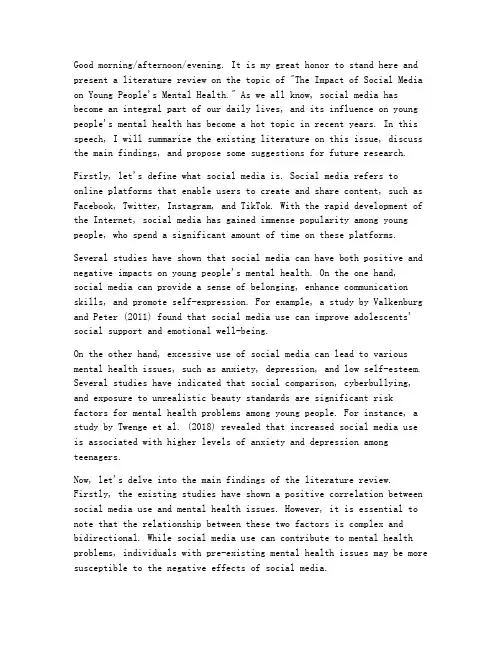
Good morning/afternoon/evening. It is my great honor to stand here and present a literature review on the topic of "The Impact of Social Media on Young People's Mental Health." As we all know, social media has become an integral part of our daily lives, and its influence on young people's mental health has become a hot topic in recent years. In this speech, I will summarize the existing literature on this issue, discuss the main findings, and propose some suggestions for future research.Firstly, let's define what social media is. Social media refers to online platforms that enable users to create and share content, such as Facebook, Twitter, Instagram, and TikTok. With the rapid development of the Internet, social media has gained immense popularity among young people, who spend a significant amount of time on these platforms.Several studies have shown that social media can have both positive and negative impacts on young people's mental health. On the one hand,social media can provide a sense of belonging, enhance communication skills, and promote self-expression. For example, a study by Valkenburg and Peter (2011) found that social media use can improve adolescents' social support and emotional well-being.On the other hand, excessive use of social media can lead to various mental health issues, such as anxiety, depression, and low self-esteem. Several studies have indicated that social comparison, cyberbullying, and exposure to unrealistic beauty standards are significant riskfactors for mental health problems among young people. For instance, a study by Twenge et al. (2018) revealed that increased social media useis associated with higher levels of anxiety and depression among teenagers.Now, let's delve into the main findings of the literature review. Firstly, the existing studies have shown a positive correlation between social media use and mental health issues. However, it is essential to note that the relationship between these two factors is complex and bidirectional. While social media use can contribute to mental health problems, individuals with pre-existing mental health issues may be more susceptible to the negative effects of social media.Secondly, the literature review has highlighted the role of social comparison in influencing young people's mental health. Social comparison refers to the process of evaluating oneself in relation to others, often leading to feelings of inadequacy and low self-esteem. Studies have shown that excessive social comparison on social media can exacerbate feelings of envy, dissatisfaction, and depression among young people.Thirdly, cyberbullying has emerged as a significant concern in the literature. Cyberbullying involves the use of electronic communication to harm, intimidate, or harass others. Several studies have demonstrated that cyberbullying is associated with increased rates of anxiety, depression, and suicidal thoughts among young people.Finally, the literature review has highlighted the role of unrealistic beauty standards in contributing to young people's mental health issues. Social media platforms often promote an idealized image of beauty, which can lead to body dissatisfaction and eating disorders among young people.In light of the main findings of the literature review, I would like to propose some suggestions for future research. Firstly, more longitudinal studies are needed to investigate the long-term effects of social media use on young people's mental health. This will help us understand whether the relationship between social media and mental health is stable over time or changes as individuals grow older.Secondly, future research should explore the moderating factors that may influence the relationship between social media use and mental health. For example, researchers could investigate how personality traits, coping strategies, and social support networks affect the impact of social media on mental health.Thirdly, it is crucial to examine the role of interventions inmitigating the negative effects of social media on young people's mental health. This could involve the development of digital literacy programs, anti-cyberbullying campaigns, and mental health awareness initiatives.In conclusion, the existing literature has provided valuable insights into the impact of social media on young people's mental health. While social media can offer numerous benefits, it also poses significant risks to mental well-being. Future research should focus on understanding the complex relationship between social media use and mental health, identifying risk factors, and developing effective interventions to promote positive mental health among young people.Thank you for your attention. I welcome any questions or comments you may have.。
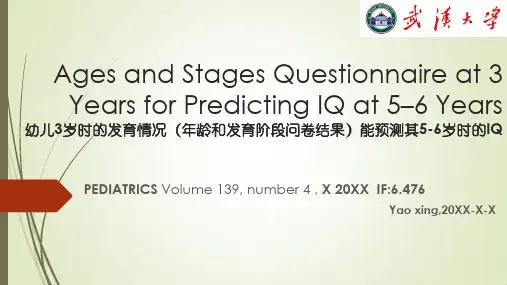
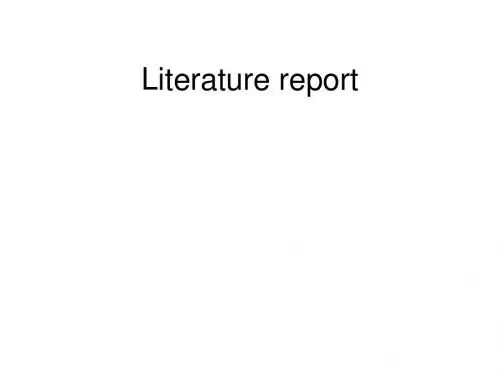
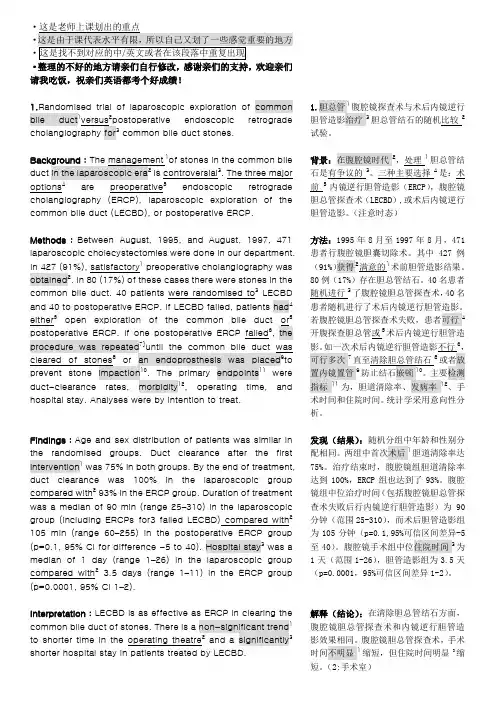
·整理的不好的地方请亲们自行修改,感谢亲们的支持,欢迎亲们请我吃饭,祝亲们英语都考个好成绩!1.Randomised trial of laparoscopic exploration of common bileduct 12endoscopic retrograde common bile duct stones.1. The three major options are preoperative endoscopic retrograde cholangiography (ERCP), laparoscopic exploration of the common bile duct (LECBD), or postoperative ERCP.Methods :Between August, 1995, and August, 1997, 471 laparoscopic cholecystectomies were done in our department. In 427 (91%), satisfactory 1 preoperative cholangiography was obtained 2. In 80 (17%) of these cases there were stones in the common bile duct. 40 patients were randomised to 3 LECBD and 40 to postoperative ERCP. If LECBD failed, patients had 455hospital stay. Analyses were by intention to treat.Findings :Age and sex distribution of patients was similar in the randomised groups. Duct clearance after the first intervention 1 was 75% in both groups. By the end of treatment, duct clearance was 100% in the laparoscopic group compared with 2 93% in the ERCP group. Duration of treatment was a median of 90 min (range 25–310) in the laparoscopic group (including ERCPs for3 failed LECBD) compared with 2 105 min (range 60–255) in the postoperative ERCP group (p=0.1, 95% CI for difference -5 to 40). Hospital stay 3 was a median of 1 day (range 1–26) in the laparoscopic group compared with 2 3.5 days (range 1–11) in the ERCP group (p=0.0001, 95% CI 1–2).Interpretation :LECBD is as effective as ERCP in clearing the common bile duct of stones. There is a non-significant trend 11.胆总管1腹腔镜探查术与术后内镜逆行胆管造影治疗3胆总管结石的随机比较2试验。
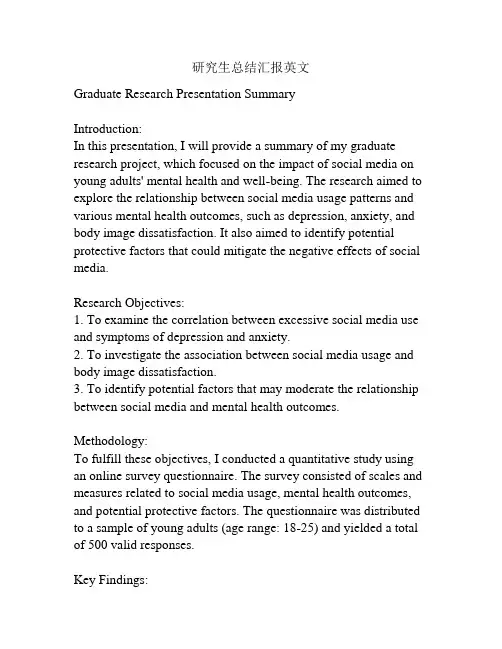
研究生总结汇报英文Graduate Research Presentation SummaryIntroduction:In this presentation, I will provide a summary of my graduate research project, which focused on the impact of social media on young adults' mental health and well-being. The research aimed to explore the relationship between social media usage patterns and various mental health outcomes, such as depression, anxiety, and body image dissatisfaction. It also aimed to identify potential protective factors that could mitigate the negative effects of social media.Research Objectives:1. To examine the correlation between excessive social media use and symptoms of depression and anxiety.2. To investigate the association between social media usage and body image dissatisfaction.3. To identify potential factors that may moderate the relationship between social media and mental health outcomes. Methodology:To fulfill these objectives, I conducted a quantitative study using an online survey questionnaire. The survey consisted of scales and measures related to social media usage, mental health outcomes, and potential protective factors. The questionnaire was distributed to a sample of young adults (age range: 18-25) and yielded a total of 500 valid responses.Key Findings:1. Excessive social media use was found to be positively correlated with symptoms of depression and anxiety. Individuals who reported spending more time on social media platforms also reported higher levels of these mental health issues.2. Significant associations were observed between social media usage and body image dissatisfaction. Participants who reported comparing themselves to others on social media platforms exhibited higher levels of body dissatisfaction.3. The presence of a strong support system, both online and offline, was found to play a significant role in mediating the negative effects of social media on mental health outcomes.Implications and Recommendations:The findings from this research project have several implications for mental health professionals, educators, and policymakers. Firstly, it highlights the need for increased awareness about the potential negative effects of excessive social media use, particularly among young adults. Addressing this issue should be incorporated into mental health prevention and intervention programs.Secondly, interventions aimed at promoting body positivity and media literacy can be effective strategies to reduce body image dissatisfaction related to social media. Educating young adults about the unrealistic nature of social media content and providing them with tools to critically evaluate and challenge these images can be beneficial.Lastly, fostering supportive online and offline networks is crucial in mitigating the negative impact of social media on mental health.Encouraging individuals to engage in positive online communities and establishing peer support programs can help create a sense of belonging and reduce feelings of isolation.Conclusion:To conclude, this research project provided insights into the relationship between social media usage patterns and mental health outcomes among young adults. The findings strongly suggest the need for proactive measures to address the potential negative impact of social media on mental well-being. By promoting awareness, implementing targeted interventions, and fostering supportive networks, we can create a healthier online environment for young adults.。
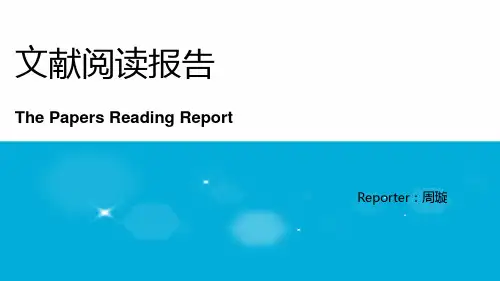
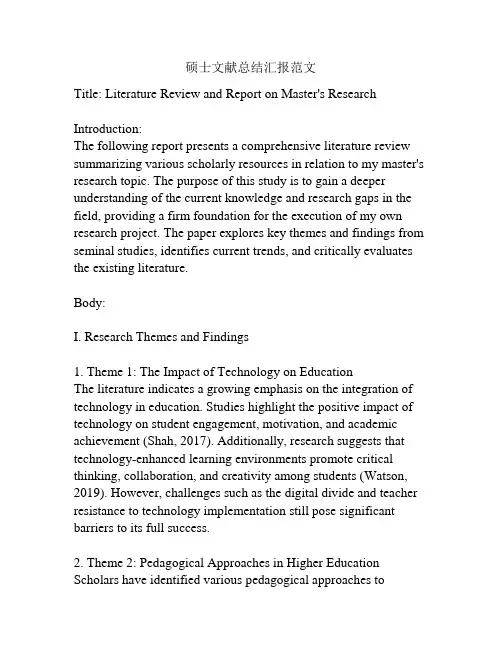
硕士文献总结汇报范文Title: Literature Review and Report on Master's Research Introduction:The following report presents a comprehensive literature review summarizing various scholarly resources in relation to my master's research topic. The purpose of this study is to gain a deeper understanding of the current knowledge and research gaps in the field, providing a firm foundation for the execution of my own research project. The paper explores key themes and findings from seminal studies, identifies current trends, and critically evaluates the existing literature.Body:I. Research Themes and Findings1. Theme 1: The Impact of Technology on EducationThe literature indicates a growing emphasis on the integration of technology in education. Studies highlight the positive impact of technology on student engagement, motivation, and academic achievement (Shah, 2017). Additionally, research suggests that technology-enhanced learning environments promote critical thinking, collaboration, and creativity among students (Watson, 2019). However, challenges such as the digital divide and teacher resistance to technology implementation still pose significant barriers to its full success.2. Theme 2: Pedagogical Approaches in Higher Education Scholars have identified various pedagogical approaches toenhance learning outcomes in higher education. Problem-based learning, for instance, has been found to promote problem-solving skills and critical thinking (Savery & Duffy, 2015). On the other hand, inquiry-based learning fosters student engagement and deep conceptual understanding (Barrows & Tamblyn, 2017). The literature also highlights the significance of adopting learner-centered approaches to promote active learning and student autonomy.II. Current Trends in Research1. Trend 1: Blended LearningBlended learning, which combines face-to-face instruction with online learning activities, has gained popularity in recent years. Studies indicate that this hybrid approach offers flexibility, personalized learning experiences, and increased student satisfaction (Graham, 2019). The integration of digital technologies in a physical classroom setting allows for interactive learning experiences and greater access to resources.2. Trend 2: Mobile LearningMobile learning, facilitated by smartphones and tablets, is an emerging trend in education. This approach enables learning anytime and anywhere, providing students with access to educational content beyond the boundaries of traditional classrooms (Sharples, 2019). The literature suggests that mobile learning enhances student engagement, motivation, and information retention.III. Evaluation of Existing LiteratureWhile the reviewed literature provides valuable insights, there are certain limitations worth noting. Firstly, most studies primarily focus on the quantitative measurement of academic performance indicators without adequately exploring the qualitative dimensions of learning experiences. There is a need for further research that considers student perceptions, engagement, and satisfaction. Additionally, existing literature often lacks a comprehensive understanding of the socio-cultural factors influencing technology adoption and its impact on different learner populations.Furthermore, the reviewed literature predominantly focuses on the Western context, resulting in a lack of diversity in cultural perspectives. Future studies should strive to incorporate a broader range of contexts, including non-Western countries, to create a more inclusive and globally relevant body of knowledge.Conclusion:This literature review provides an overview of the current trends, key themes, and findings in the field of technology-enhanced education and pedagogical approaches in higher education. The analysis highlights the positive impact of technology on education, the significance of learner-centered approaches, and emerging trends like blended and mobile learning. However, the existing literature also reveals research gaps related to qualitative aspects of learning experiences and the socio-cultural context of technology adoption. Future studies should aim to address these gaps, fostering a more inclusive and comprehensive understanding of the topic.Overall, this literature review serves as a foundation for my master's research project, guiding the selection of research methodologies and informing the design of interventions for the enhancement of teaching and learning in higher education.。
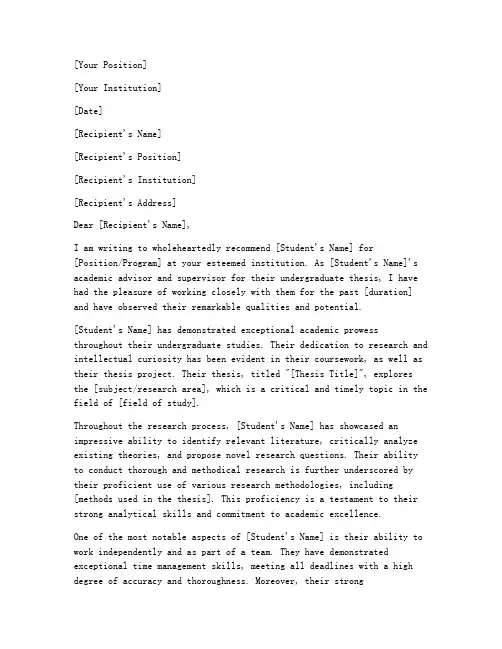
[Your Position][Your Institution][Date][Recipient's Name][Recipient's Position][Recipient's Institution][Recipient's Address]Dear [Recipient's Name],I am writing to wholeheartedly recommend [Student's Name] for[Position/Program] at your esteemed institution. As [Student's Name]'s academic advisor and supervisor for their undergraduate thesis, I have had the pleasure of working closely with them for the past [duration] and have observed their remarkable qualities and potential.[Student's Name] has demonstrated exceptional academic prowess throughout their undergraduate studies. Their dedication to research and intellectual curiosity has been evident in their coursework, as well as their thesis project. Their thesis, titled "[Thesis Title]", explores the [subject/research area], which is a critical and timely topic in the field of [field of study].Throughout the research process, [Student's Name] has showcased an impressive ability to identify relevant literature, critically analyze existing theories, and propose novel research questions. Their ability to conduct thorough and methodical research is further underscored by their proficient use of various research methodologies, including [methods used in the thesis]. This proficiency is a testament to their strong analytical skills and commitment to academic excellence.One of the most notable aspects of [Student's Name] is their ability to work independently and as part of a team. They have demonstrated exceptional time management skills, meeting all deadlines with a high degree of accuracy and thoroughness. Moreover, their strongcommunication skills have allowed them to effectively collaborate with peers and mentors, fostering a positive and productive research environment.In addition to their academic achievements, [Student's Name] has been an active participant in various extracurricular activities and organizations. Their involvement in [specific activities/organizations] has not only enriched their college experience but has also honed their leadership and teamwork abilities. Their passion for [field of study] is evident in their commitment to these activities, and I have no doubtthat they will continue to excel in this area.What sets [Student's Name] apart from their peers is their unwavering dedication to personal and professional growth. They are self-motivated, proactive, and possess a strong work ethic. Their strong moral compass and commitment to ethical research practices make them an ideal candidate for [Position/Program] at your institution.In conclusion, I am confident that [Student's Name] will bring great value to [Position/Program] at your institution. Their exceptional academic record, research abilities, and personal qualities make them a highly promising candidate. I wholeheartedly recommend [Student's Name] without reservation and would be more than happy to provide further information about their qualifications upon request.Thank you for considering [Student's Name] for [Position/Program]. I am confident that they will make a significant contribution to your institution and the field of [field of study].Sincerely,[Your Name][Your Position][Your Institution][Your Contact Information]。
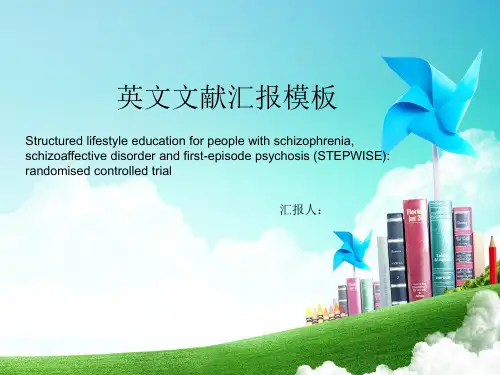
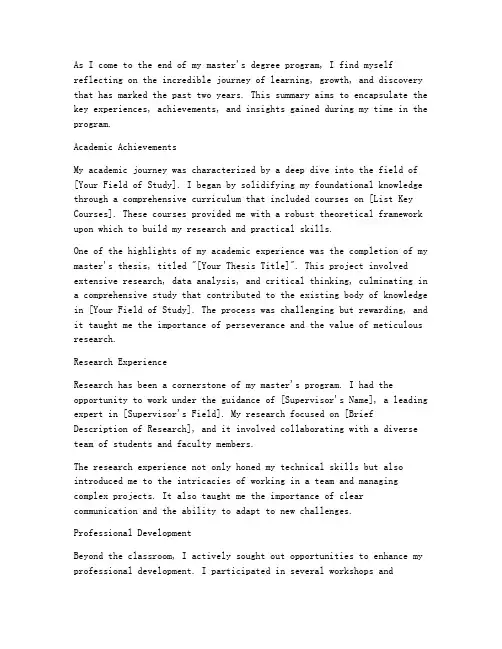
As I come to the end of my master's degree program, I find myself reflecting on the incredible journey of learning, growth, and discovery that has marked the past two years. This summary aims to encapsulate the key experiences, achievements, and insights gained during my time in the program.Academic AchievementsMy academic journey was characterized by a deep dive into the field of [Your Field of Study]. I began by solidifying my foundational knowledge through a comprehensive curriculum that included courses on [List Key Courses]. These courses provided me with a robust theoretical framework upon which to build my research and practical skills.One of the highlights of my academic experience was the completion of my master's thesis, titled "[Your Thesis Title]". This project involved extensive research, data analysis, and critical thinking, culminating in a comprehensive study that contributed to the existing body of knowledge in [Your Field of Study]. The process was challenging but rewarding, and it taught me the importance of perseverance and the value of meticulous research.Research ExperienceResearch has been a cornerstone of my master's program. I had the opportunity to work under the guidance of [Supervisor's Name], a leading expert in [Supervisor's Field]. My research focused on [Brief Description of Research], and it involved collaborating with a diverse team of students and faculty members.The research experience not only honed my technical skills but also introduced me to the intricacies of working in a team and managing complex projects. It also taught me the importance of clear communication and the ability to adapt to new challenges.Professional DevelopmentBeyond the classroom, I actively sought out opportunities to enhance my professional development. I participated in several workshops andseminars, including those on [List Relevant Workshops or Seminars]. These experiences provided me with practical skills and industryinsights that are invaluable for my future career.Additionally, I took on a teaching assistantship for a course in [Course Name]. This role allowed me to apply my knowledge in a teaching context, helping me develop my pedagogical skills and my ability to communicate complex concepts effectively.Personal GrowthThe master's program has been a transformative experience on a personal level as well. I have learned to manage my time more efficiently, tothink critically and analytically, and to approach challenges with a positive attitude. These skills have not only improved my academic performance but have also prepared me for the professional world.Future GoalsLooking forward, I am excited about the opportunities that lie ahead. I plan to pursue a career in [Your Desired Field], where I hope to apply the knowledge and skills I have acquired during my master's program. My ultimate goal is to make a meaningful contribution to the field of [Your Field of Study] and to continue my professional development through ongoing research and learning.In conclusion, my master's degree program has been an enriching and transformative experience. It has equipped me with the academic foundation, research skills, and professional competencies necessary to excel in my chosen field. I am grateful for the support of my professors, peers, and mentors, and I look forward to applying the lessons learnedto the next chapter of my life.。
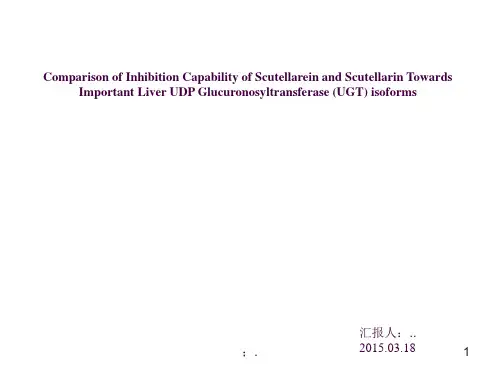
研究生英语说明文范文举例Researching Graduate EnglishEnglish is a language that is spoken by people around the world. For those who are studying to become a graduate, English is an important subject. This paper will explain the importance of studying English as a graduate student.On the most basic level, English is essential for communication. For any successful professional, it is important to be able to clearly express ideas and communicate effectively. Without English, it would be difficult to interact with colleagues or customers in a professional context. In addition, many graduate programs require a certain level of English literacy in order to understand course material. Knowing how to read, write, and comprehend English is an essential part of success in graduate studies.English is also important for research. Much of the academic and scientific literature is written in English, so it is important to be able to understand it. In addition, English is the language used in many international conferences. For those who are involved in research, being able to understand and present their findings in English can make a huge difference.Finally, English is necessary for job applications and interviews. Many companies have job postings that are only in English, and the interview process typically involves some degree of English proficiency. In addition, English is the language of the global economy, so having a good command of English can make a candidate much more attractive to potential employers.In conclusion, English is an important subject for graduate students. It is necessary for communication, research, and job interviews, and it can be a key factor in achieving success in graduate studies and in a professional career.。